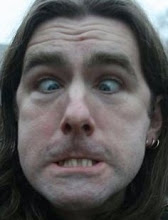The generations that grew up between the Second World War and the collapse of communism grew up with a constant threat of nuclear war. Incidents like the Bay of Pigs and the Cuban missile crisis heightened tensions between the Eastern Bloc and NATO and seemed to prove the need for countries to arm themselves with nuclear weapons to deter the possibility of a nuclear strike.It was against this climate that the original trident program was conceived to much controversy in the early 1980's. Now in 2007 the British Government has renewed the Trident missile system. More than 90 Labour MP's voted against this and the bill was only passed with support from Conservative MP's. There were also many campaigns against the renewing of Trident from various organisations and members of the public.
One of the reasons for opposing the renewal of Trident is that it seems to go against the nuclear non-proliferation treaties that were signed beginning with the one that was signed the day I got my first electric guitar. The powers that held nuclear weapons agreed to end the arms race and moderate the ownership of these weapons of mass destruction, now Britain has committed itself to buying more missiles.
But who now is the enemy? The Soviet Union no longer exists, the Russian Confederation is an ally and some of the former Soviet states are now members of the EU. Who are we considering might be such a threat that we feel we may still need to use a nuclear weapon? Such weapons are useless in the war against terror. The network of terrorists isn't based in one country or region. During the 2002 war in Afghanistan pictures were broadcast on the news of allied bomb strikes on al-Qaeda training camps. All they showed was multi-million pound bombs and missiles blowing up empty acres of sand. To use a nuclear missile against a target that has no territory necessitates blowing up a huge area of a third party's land. Holding such weapons gives us no advantage at all against enemies such as these.
Argument was also made that there would be economic hardship caused by not renewing Trident. Barrow in Cumbria – where the Trident submarines are made – is an area of economic hardship, and not to renew Trident would cause more unemployment and further poverty in a town already much in need of regeneration and investment. This has to be one of the most ridiculous arguments I heard for the renewal of trident as if it weren't renewed there would be a huge pot of money available to spend: more than enough to invest in Barrow and prevent the predicted social deprivation.
But is there an alternative to renewing Trident? I don't mean an alternative weapons system that would afford us the same level of 'protection'. I mean is there an alternative to spending such huge sums of money to prevent terrorism and other acts of aggression towards us? Is there a way that reflects Christian Love and Compassion, a way in which we can see God's reflection? I believe there is.
I think the West has to make big apologies to many other states and cultures and seek forgiveness for past aggression. We have a history of bludgeoning our way around the world and dominating and subjugating foreign places and this is what is now coming back to bite us. Our political leaders and Captains of Industry have invaded, oppressed and exploited all corners of the world and forced Western values as completely as we can. Our biggest success in this is the US. European 'settlers' took such control of a 'new' country at the expense of the Native American population to the extent that it is the settlers' descendants that are now running the US and the Native American population is almost off the radar.If we want to really protect ourselves and make the world a safer place then we need to listen to what other cultures are telling us and address their grievances. We need to actually make peace with nations rather than just make sure that we're stronger than them. We need to take real steps to end poverty and stop the exploitation that's carried out in our name. We need to judge ourselves, judge our history, then do what is right and do justice by all those we have previously aggrieved.
Politicians will never do this though. It is a long-term strategy and political parties only think as far as the next general election. They tell us that it would be too expensive. True it would cost a lot of money, but in the long term it would save billions of dollars currently being spent on weaponry and it would save countless lives in this country and across the world. Politicians will never do this because it is a much more difficult route than simply spending billions of pounds on a weapons system which a massive proportion of the electorate don't want.




